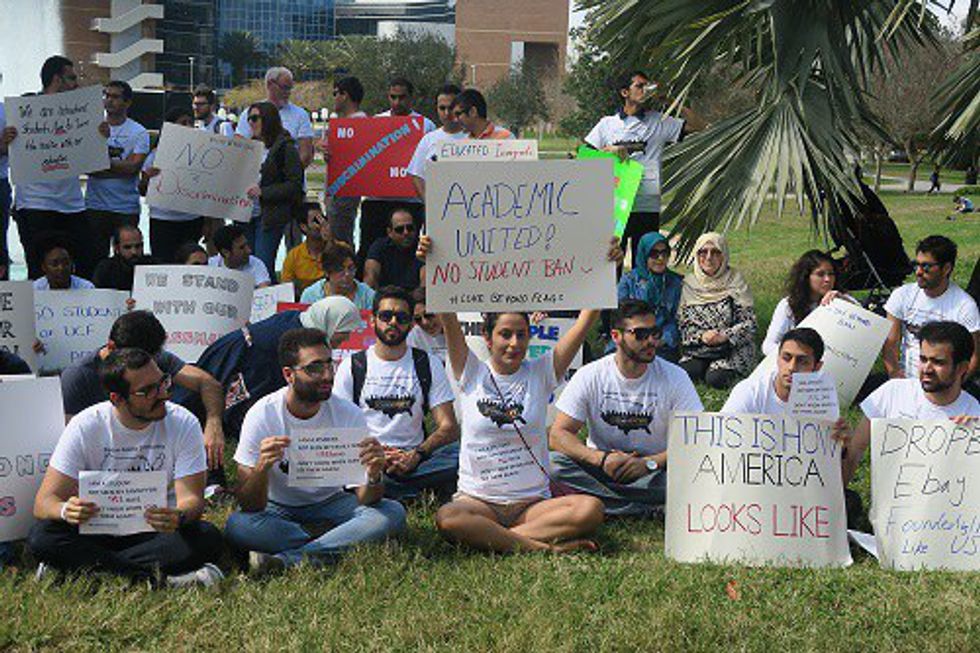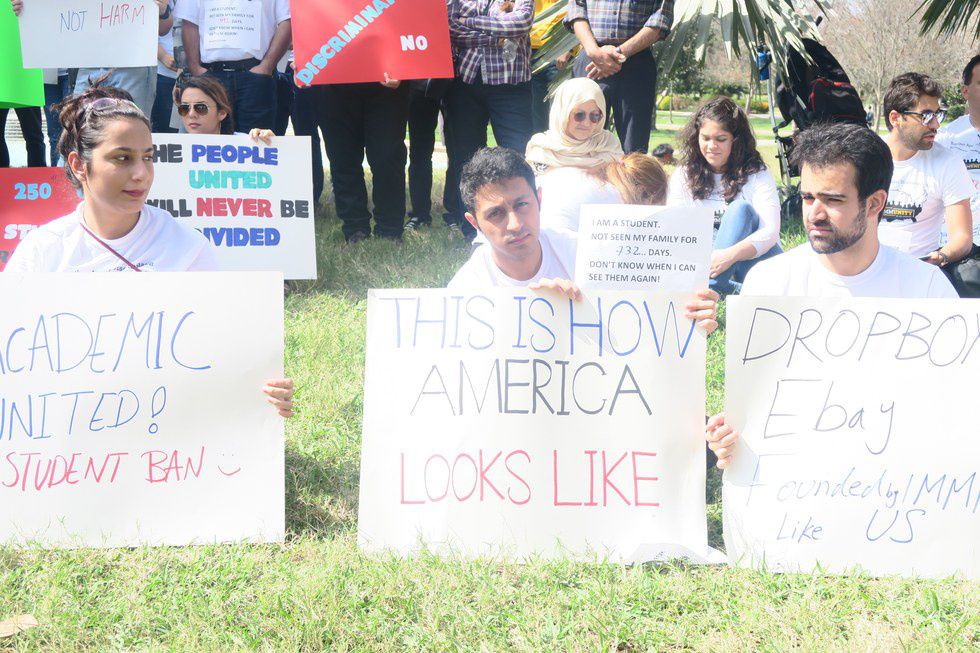Thursday, February 8th, my brother and I made our way up the hill to the Reflection Pond at University of Central Florida. We saw a line of white shirts that dispelled our worry that no one else would show up. People would show up to something like this, recent events have proved this.
It was pretty hot, despite the fact that it was only the early stages of February. Such is life in Central Florida. Regardless of the weather, the Academics United group would demonstrate their worries and frustrations. The students demonstrating were all from or had family in the seven countries (Iran, Syria, Sudan, Somalia, Iraq, Libya, and Yemen) that President Donald Trump placed a travel ban upon, the ban that many are calling a "Muslim Ban."
I was greeted by an organizer who was far too busy to give me her name, and she handed me a sign that said "Love is Wise Hatred is Foolish," and I joined the rest of the group, my brother standing behind me and UCF English Professor Pearson Bolt to my right.
After a good ten minutes of holding the prudent sign and talking to the other demonstrators around me, I decided it was time to get a good interview or two. I gave my sign to my otherwise sign-less brother and made my way through the growing crowd.
I got to the small tent where Academics United was handing out pamphlets and the uniform white t-shirts to meet Sepehr Benis, who is pursuing a PhD at UCF. He agreed to an interview.
"What's going on here, if you could describe the scene?"
"We are gathering here in a peaceful way to show our sadness about the recent executive order from the President about banning people from seven countries. So the most important thing that we are trying to show here is that we don't want to intervene at all in the politics of the United States. The only thing we are saying is that it's not right and it's not correct to have a blanket ban on everyone from these countries because there are a lot of students coming from different majors to this country."
The clamor of the growing crowd rose and Sepehr got closer, raising his voice. People in clad in a white-shirt-solidarity stood while students and professors alike looked on, murmuring opinions to each other.
"There are a lot of kids and people that coming here for medical issues because there is no doubt that this is one of the greatest countries in the world; in education, in medicine, in everything. So, that's the whole thing. That we want to show that this is not right to ban students coming from this country, to ban families coming from this country to visit their kids here."
"As a PhD student, I don't have an opportunity to go out of this country to be involved in conferences. If I did, I could not come back to pursue my studies here. So, one of the most important things is; we are trying to ask authorities of our university to help us in this manner, because they have more of a voice than us, to help us in this manner, and the students that are stuck in their home countries can not come here to continue their studies."
He looked out over the group, with a mixture of pride and sadness, then continued. "The students need more time, for example, if they can not come back for this semester, to let them come back for the next semester. There are a lot of graduate students that are on fundings and there are a lot of projects going on that will be damaged, even though the government is funding them." He was referring here to projects that Middle Eastern students are working on that are interrupted by the travel ban, despite the government funding behind these projects."
"You have a sign on your shirt that says 'I have not seen my family for 925 days.' How has the affected your education as a PhD student?"
"Yeah, you see every day, I wake up and I want to come to my lab. my office, to work, I'm thinking 'What happens if something happens to my grandma, something happens to my grandfather? What happens if I cannot see my sister's wedding? What happens if I cannot see my family?' I have a younger sister, she is ten years old. I cannot be with her in her best years, to help her, to guide her. I know I came here to study and I will be far from my country, but they used to be able to come visit, they can't now and I can't visit them. These are all concerns that are preventing me to work on my studies and education."
The head of Academics United whistled to gather everyone's attention, but Sepehr continued.
"Americans definitely know, every holiday, you are all going home, your family. But we are stuck here, thinking about what happens with my family. Why me? Why can't I visit my family?"
This is part one of a two-part piece on the demonstration at UCF. I don't want to diminish the importance of the second interview, or the first for that matter, by making them too lengthy (which this one has become, whoops). Clearly, there is a lot of pain and worry, and I'm afraid one post, or two, cannot cover the hundreds affected by this. But, one thing we can ask, in solidarity, is; What about Sepehr's family? What about the many families affected by this "travel ban?"



























